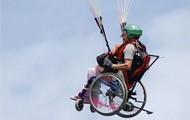Inception
I am a person who is hard of hearing, but unlike most people who are hard of hearing and use spoken language or sign language to communicate, I can't communicate with spoken language smoothly, nor can I use sign language skillfully. Most of what I say can only be understood by a minority of people, such as my mother and my friends. Usually, I communicate with others through pen. In other words, I use written language.
Four years ago, I went to work in a school for deaf students. From the moment I made contact with groups of people who were also hard of hearing, I began to learn sign language. One day, I taught the students the English word “dream”. To help them understand the two meanings of the word – the noun “dream” and the verb “to dream” – I asked the students what their dreams were like and how they communicate in them. They all told me that there are no voices in their dreams and they talk by using sign language. This shocked me. Though there are also no voices in my dreams, unlike the students, I communicate through subtitles which appear in my dreams, the same way subtitles appear during dialogue in a movie.

Within the Deaf and hard of hearing community, people like me who use written language to communicate are relatively marginalized. Recently, while participating in an activity organized by “Youren magazine” to make a sentence using “Youren”, I made the remark, “the world has all kinds of people, and we should seek common ground while respecting differences. However, here today, I want to say that amongst people in the hard of hearing community, there are also various kinds of people who are hard of hearing.”
At the 2013 China Wuhan Handicapped Youth Leadership Training Camp held by One Plus One, whether arranged deliberately or by coincidence, the attendees had completely different hearing disabilities, but had so much else in common. Like me, one of them grew up in a voiced environment, and mastered the methods to communicate in voiced environments in both Chinese and English. However, unlike me, she mastered one more communicative method: the phonetic form.
There was another participant who, like me, communicates using a silent method. He uses sign language, while I use pen. Sign language is the mainstream language in the silent environment, and also the mother tongue of a majority of people who are hard of hearing.
Yet another person who attended and works with One Plus One is bilingual. Amazingly, she can communicate bilingually with spoken language in voiced environments and can use sign language in silent environments. Long ago, I had hoped that my students and I myself would be bilingual like her or, even if they couldn’t communicate with spoken language in a voiced environment, that my students would be able to use two written languages, not limited to live in one silent world.
Perhaps many people who are hard of hearing are used to using sign language, and they don't like to learn the communicative ways of phonetics or written language. However, I wrote down my story to say how important I believe it is to try to seek common ground while at the same time respecting differences.






